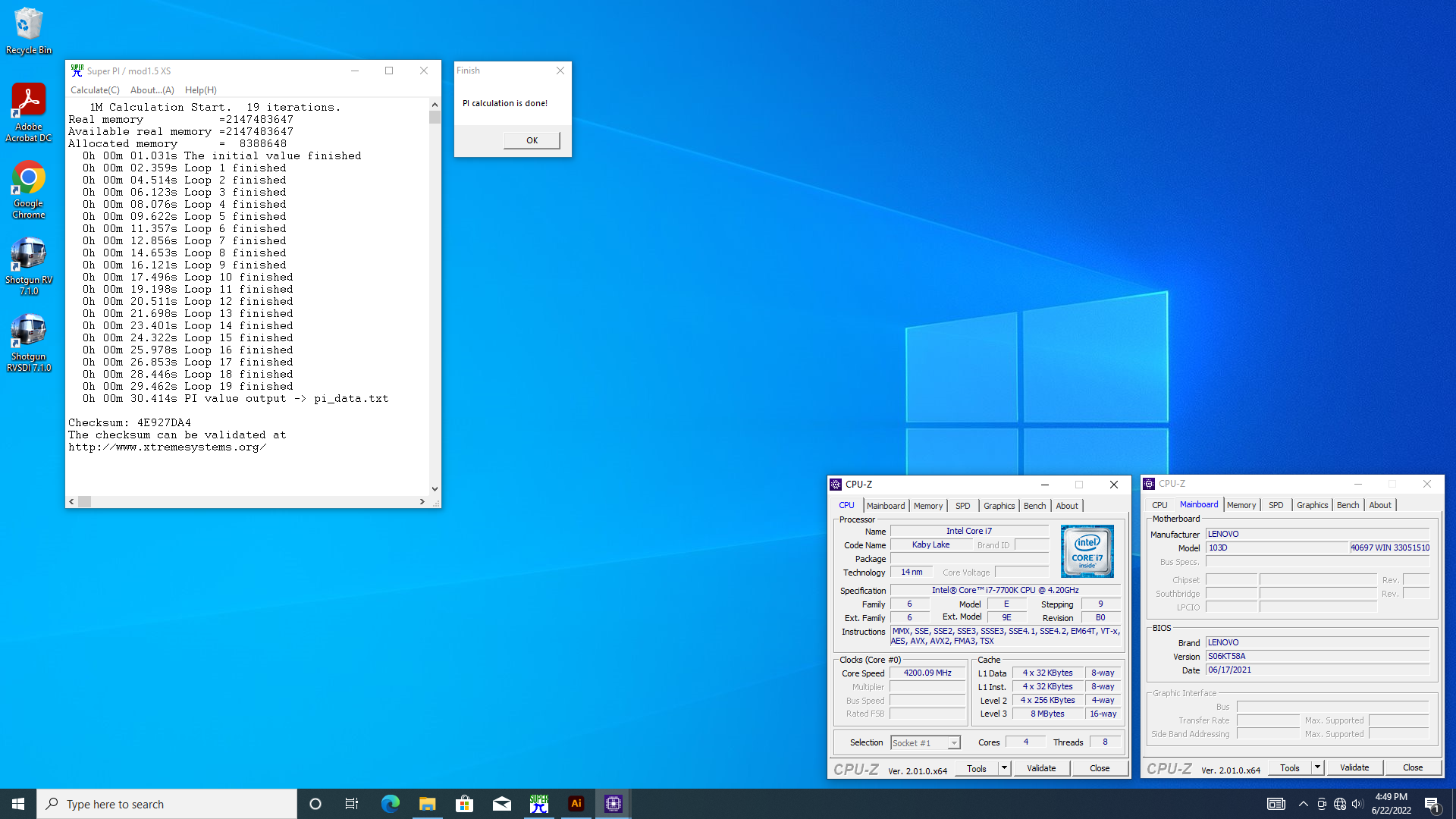SuperPi - 1M score 30sec 414ms with a i7-7700K
Thursday, 01 January 1970 07:00 | Update at null
Media Gallery
Screenshot

Device, Setup, etc

URL
https://hwbot.org/submission/5024405https://www.facebook.com/hakimnu.id/posts/3323115661254407
Information Detail
Hardware: Intel Core i7 7700K
Specs:CPUID : Intel(R) Core(TM) i7-7700K CPU @ 4.2GHz
Architecture : x86
Codename : Kaby Lake
L3 Cache : 8MB
Clock : 4.2GHz - 4.5GHz
Core/Thread : 4/8
TDP : 91W
Technology : 14nm
Socket : LGA1151
IGPU : Intel HD Graphics 630
See more specification...
Software: SuperPi - 1M
Score: 30sec 414ms
About: SuperPi - 1MSuperPi - 1M is one of the classic and popular benchmarks used to measure single-thread CPU performance by calculating the number π (pi) to 1 million decimal places. This benchmark has long been a favorite benchmark among tech enthusiasts, overclockers, and hardware testers due to its simplicity, speed, and accuracy in directly assessing processor performance.
In SuperPi 1M testing, only one CPU core is used to complete the calculation as quickly as possible. This makes it ideal for assessing the single-core capability of a CPU, especially in scenarios where single-core performance remains highly relevant, such as in lightweight applications, gaming, or everyday use.
Despite its simplicity, SuperPi 1M is highly sensitive to clock speed, memory latency, and processor architecture efficiency. As a result, this benchmark is often used as a standard in overclocking competitions, as even small differences in system configuration can lead to significantly different execution times.
Features and Advantages:
- Calculates 1 million digits of the number π (pi) with precision.
- Emphasizes the single-thread performance of the processor.
- Runs quickly, ideal for repeated testing.
- Suitable for comparing CPU architecture efficiency.
- Still widely used in the global overclocking community.
Despite the availability of many modern benchmarks, SuperPi 1M remains a significant tool in CPU testing due to its direct representation of basic computational performance. This benchmark is also lightweight and compatible with nearly all Windows versions, making it a practical tool for quick system evaluation.
The Intel Core i7-7700K, launched in early 2017, is a high-performance desktop processor from the 7th generation Kaby Lake family. Built on the 14nm process, the i7-7700K features 4 physical cores and 8 threads, thanks to Hyper-Threading Technology, and is targeted at enthusiasts, gamers, and power users. It operates at a base frequency of 4.2 GHz and can boost up to 4.5 GHz via Intel Turbo Boost, delivering excellent single-threaded performance one of the highest at the time of its release.
As part of Intel’s “K” series, the Core i7-7700K has an unlocked multiplier, making it ideal for overclocking on compatible Z-series motherboards. However, with a TDP of 91W, the processor demands an effective cooling solution, especially when overclocked beyond its stock speeds. Users typically pair this CPU with aftermarket air or liquid coolers to ensure thermal stability under heavy workloads or gaming sessions.
The processor includes Intel HD Graphics 630, which supports 4K output at 60Hz and is sufficient for basic tasks like web browsing, video playback, and office work. However, for serious gaming or GPU-accelerated workloads, a discrete graphics card is still necessary, especially when paired with a high-refresh-rate monitor or demanding software.
In terms of real-world performance, the i7-7700K remains capable even today for 1080p and 1440p gaming, general productivity, and creative tasks. It delivers solid frame rates in many modern titles when used with a modern GPU, and it handles applications like Adobe Photoshop, Premiere Pro, and coding environments reasonably well. However, due to its limited core count by today’s standards and lack of PCIe 4.0 support, it has started to show its age in multi-threaded and next-gen workloads.
Despite being surpassed by newer Intel and AMD CPUs with more cores and better efficiency, the i7-7700K still holds value in many mid-range desktop setups, especially for users who already own an LGA 1151 system and want to maximize performance without a full platform upgrade.
* Not Avaiable
